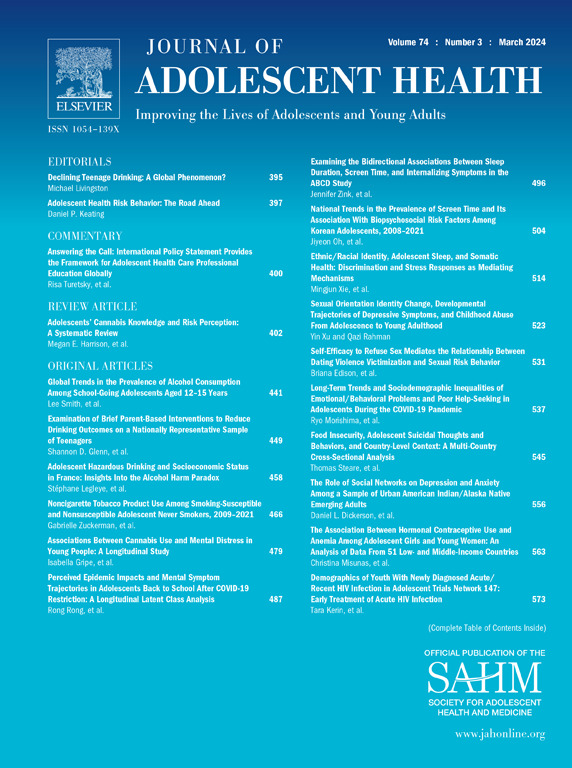了解 COVID-19 期间的经济不稳定和粮食不安全是否会调节情感虐待和情感忽视随时间的变化:来自中国、刚果民主共和国、印度尼西亚和马拉维的 COVID-19 前后纵向分析。
IF 5.5
2区 医学
Q1 PEDIATRICS
引用次数: 0
摘要
目的:本研究探讨了经济不稳定或粮食不安全是否会调节情感虐待和忽视随时间的变化:我们使用了全球青少年早期研究(Global Early Adolescent Study)的数据,该研究是一项纵向研究,研究对象是来自中国(n = 387)、刚果民主共和国(DRC)(n = 285)、印度尼西亚(n = 400)和马拉维(n = 320)贫困城市社区的 13-18 岁青少年(COVID-19 前一轮研究期间为 10-14 岁)。数据收集于疫情爆发前(2017 年至 2020 年 3 月)和疫情爆发期间(2020 年 6 月至 11 月)。使用反概率加权的广义估计方程评估了COVID-19之前和期间情感虐待和忽视的变化,并检验了这些变化是否因COVID-19期间的经济不稳定和粮食不安全经历而有所不同:结果:在 COVID-19 之前,情感虐待的比例从刚果民主共和国的 37.2% 到印度尼西亚的 65.3%,情感忽视的比例从刚果民主共和国的 10.9% 到印度尼西亚的 50.3%。在 COVID-19 期间,除印度尼西亚外,所有地区的情感忽视几率都有所上升(调整后的几率(aOR)从中国的 1.7 到马拉维的 4.1 不等)。在印度尼西亚,虐待和忽视的几率在COVID-19期间显著下降(aOR从0.4到0.7不等);然而,对于那些经历过经济不稳定和/或粮食不安全的青少年来说,情感虐待和/或忽视的下降并不明显。在马拉维,经历过粮食不安全的青少年在 COVID-19 期间遭受情感忽视的几率显著增加:讨论:COVID-19大流行加剧了中低收入国家青少年的情感忽视和情感虐待,尽管这种影响因地点和人群而异。在马拉维和印度尼西亚,经历过经济不稳定和/或粮食不安全的青少年在COVID-19期间会有更多不利的结果,这凸显了社会项目在大流行期间纠正不公平现象的重要性。本文章由计算机程序翻译,如有差异,请以英文原文为准。
Understanding Whether Economic Instability and Food Insecurity During COVID-19 Moderate the Change in Emotional Abuse and Emotional Neglect Over Time: A Longitudinal Pre- and During COVID-19 Analysis From China, Democratic Republic of Congo, Indonesia, and Malawi
Purpose
This study explores whether economic instability or food insecurity moderates the changes in emotional abuse and neglect over time.
Methods
We used data from the Global Early Adolescent Study, a longitudinal study among adolescents ages 13–18 years (10–14 during pre–COVID-19 round) from poor urban communities in China (n = 387), the Democratic Republic of Congo (DRC) (n = 285), Indonesia (n = 400), and Malawi (n = 320). Data were collected before (2017 to March 2020) and during the pandemic (June to November 2020). Generalized estimating equations, using inverse probability weights evaluated changes in emotional abuse and neglect pre- and during COVID-19 and tested whether these changes varied by economic instability and food insecurity experiences during COVID-19.
Results
Pre–COVID-19, emotional abuse ranged from 37.2% in DRC to 65.3% in Indonesia, and emotional neglect from 10.9% in DRC to 50.3% in Indonesia. The odds of emotional neglect increased in all sites during COVID-19 except Indonesia (adjusted odds ratio (aOR) ranging from 1.7 in China to 4.1 in Malawi). In Indonesia, odds of abuse and neglect decreased significantly during COVID-19 (aOR ranging from 0.4 to 0.7); however, emotional abuse and/or neglect declines was less pronounced for those who experienced economic instability and/or food insecurity. In Malawi, adolescents who experienced food insecurity had a significant increase in odds of emotional neglect during COVID-19.
Discussion
The COVID-19 pandemic exacerbated emotional neglect and emotional abuse among adolescents living in low- and middle-income countries, although this effect varies by place and population. In Malawi and Indonesia, adolescents who experienced economic instability and/or food insecurity had more unfavorable outcomes during COVID-19, highlighting the importance of social programs correcting inequities during pandemics.
求助全文
通过发布文献求助,成功后即可免费获取论文全文。
去求助
来源期刊

Journal of Adolescent Health
医学-公共卫生、环境卫生与职业卫生
CiteScore
10.40
自引率
3.90%
发文量
526
审稿时长
46 days
期刊介绍:
The Journal of Adolescent Health is a scientific publication dedicated to enhancing the health and well-being of adolescents and young adults. Our Journal covers a broad range of research topics, spanning from the basic biological and behavioral sciences to public health and policy. We welcome a variety of contributions, including original research papers, concise reports, literature reviews, clinical case reports, opinion pieces, and letters to the editor. We encourage professionals from diverse disciplines such as Anthropology, Education, Ethics, Global Health, Health Services Research, Law, Medicine, Mental and Behavioral Health, Nursing, Nutrition, Psychology, Public Health and Policy, Social Work, Sociology, and Youth Development to share their expertise and contribute to our mission of promoting adolescent health. Moreover, we value the voices of young individuals, family and community members, and healthcare professionals, and encourage them to submit poetry, personal narratives, images, and other creative works that provide unique insights into the experiences of adolescents and young adults. By combining scientific peer-reviewed research with creative expressions, our Journal aims to create a comprehensive understanding of the challenges and opportunities in adolescent and young adult health.
 求助内容:
求助内容: 应助结果提醒方式:
应助结果提醒方式:


